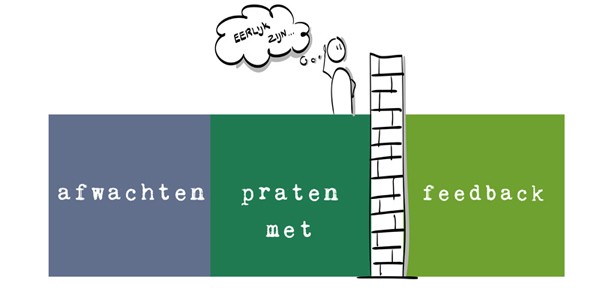The threshold to a top team
When we talk to teams about how they work together, we often initially hear the answer: we work together just fine. When we then ask further questions, it turns out that behind this answer there are roughly two 'types' of cooperation. On the one hand, groups that are actually on the cooperative side of the Cooperation Scale, moving between feedback and flow. And on the other hand, groups that are in avoidance but are nice enough to each other to experience it as cooperation. However, these two types of cooperation produce very different results. So why is it that it is sometimes so difficult for teams to make the distinction? But more importantly, why is it that it is so difficult to make the step from shirking to 'real' cooperation?
Being honest is exciting
This is what we call the threshold between avoidance and cooperation. One of the tricky steps to make as a person and as a team. For it requires being honest, just being nice is no longer enough. 'Nice where possible, fair when necessary'. And being honest is exciting. It requires self-confidence, belief in the common goal, appreciation for the other person and the guts to take the step and share your honest opinion: feedback! Often all kinds of assumptions come into play (un)consciously, making us doubt whether we should give the feedback: 'Maybe I am hurting him?' 'He has so much more experience, who am I to give him feedback?' 'I have named it so many times, why should it change now?' 'I am not his manager, giving feedback is inappropriate.' 'Then what will he have to say to me?'
These kinds of thoughts sometimes stop us from stepping over that threshold and discussing things. However, not discussing things is not going to help you as a team either. Perhaps we might still give a hint, which we hope someone hears, understands and picks up on. But this can just as easily lead to disappointment and frustration when that doesn't happen. And that frustration in turn makes it harder to be really honest and give feedback next time.
Growing together
In addition, the risk of losing freedom is often also a threshold-raising factor. Because avoidance means: everyone does their own thing in their own way. When we give real feedback - in which we are also open to the other person's ideas - we want to learn from it and move forward together towards our goal. Then things will sometimes go differently from 'your way'. Some of the freedom of shirking may be lost. But you get something much nicer in return: growing together, building on each other's ideas and qualities, appreciation, flow and more results than you could have achieved each on your own.
In short: the threshold to cooperation sometimes seems high. But if you dare to take the step and are honest when necessary, express appreciation where possible and continue to build on cooperation together, a top team is the result and you will be able to experience flow at times of high pressure.


Pingback: Is this feedback? - Scale of cooperation
Pingback: The roundabout of elopement - Scale of cooperation
Pingback: All top teams 'securing', but what is that really? - Scale of cooperation